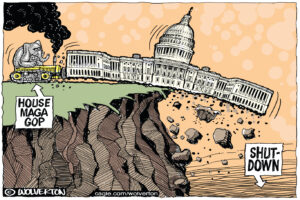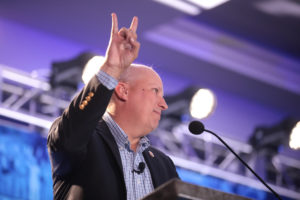When Cuts Don’t Cut It
After slamming Democrats for not focusing on "jobs, jobs, jobs," Republicans have decided to ignore their own winning message in favor of "cuts, cuts, cuts."After slamming Democrats for not focusing on “jobs, jobs, jobs,” Republicans have decided to ignore their own winning message in favor of “cuts, cuts, cuts.” This is bad economics — and bad politics.
If you don’t believe me, read a new NBC/Wall Street Journal poll, published Thursday, that has what should be sobering news for Republicans who keep telling us that their radical assault on the size and scope of government has the support of “the American people.”
It doesn’t, according to the survey — not even philosophically. When asked whether government, in general, is trying to do too much or not doing enough, 51 percent said government should do more. That’s not exactly a mandate for slashing federal, state and municipal programs and trying to turn public employees into a caste of untouchables.
For Wisconsin Gov. Scott Walker and other state and local GOP officials who are trying to crush public employee unions by eliminating collective bargaining rights, the poll suggests extreme caution — not that Walker is likely to pay heed. According to the survey, 77 percent of those surveyed believe that public workers should have the same bargaining rights as private-sector employees.
If Walker really wants to think of himself as the next Ronald Reagan, somebody ought to tell him that Reagan once headed the Screen Actors Guild. Which is a union.
For Republicans in Congress, especially the fired-up new majority in the House, there is plenty of cautionary news. The poll listed a number of issues facing the country and asked respondents to rank them in order of importance. Then the pollsters tallied how many respondents had ranked each issue either first or second in priority.
A pretty impressive 40 percent said that “the deficit and government spending” should be considered the federal government’s No. 1 or No. 2 task. But a far more impressive 56 percent said that “job creation and economic growth” should be given first or second priority.
This clearly suggests that Republicans do have a significant constituency for the uncompromising stance they are taking on the budget. But they might want to use the two-week cease-fire, arranged on Wednesday, to consider that a much bigger constituency would rather see them working to boost growth and create jobs.
Independent economic analysts, including some from the investment firm Goldman Sachs — hardly known for liberal or bleeding-heart tendencies — have concluded that the $61 billion in current-year budget cuts being demanded by House Republicans will shave up to two percentage points off the nation’s growth rate and cause the loss of more than half a million jobs.
There are cynics — or maybe they are realists — who suspect that the GOP wouldn’t mind seeing the economy remain in the doldrums for a while, on the theory that continued high unemployment will weaken President Obama and other Democrats in the 2012 election cycle. Such machinations would be shameful and unpatriotic, of course, but also dumb. It won’t be rocket science for Democratic candidates to point to specific cuts — and remind voters of the jobs that would still exist if those cuts had not been made.
Note to the GOP: Americans recognize that public-sector jobs are, in fact, jobs. In fact, according to the new poll, they hold positive views of federal, state and local workers, especially teachers.
Yes, we must reduce massive deficits before they become a strangling, crushing burden. But most economists believe that now, as we struggle to emerge from a truly devastating recession, would be the worst possible time to make deep budget cuts — especially since the cuts in question, which affect only the sliver of federal spending deemed discretionary, will have negligible impact on the deficit problem. Entitlements are the real problem.
According to the NBC/Wall Street Journal poll, three-quarters of Americans would oppose significant cuts in Medicare or Social Security. If Republicans were really serious about deficit reduction, they would be trying to explain why they believe such cuts are necessary. Democrats ought to be talking about entitlements too, by the way, along with reasonable budget cuts. But the debate should take account of the undeniable fact that people actually want government services — which, unfortunately, have to be paid for.
So both parties should be explaining why any reasonable deficit-reduction program will include tax increases. “Cuts, cuts, cuts” isn’t a plan. Right now, it’s just a bad slogan.
Eugene Robinson’s e-mail address is eugenerobinson(at)washpost.com.
© 2011, Washington Post Writers Group
Your support matters…Independent journalism is under threat and overshadowed by heavily funded mainstream media.
You can help level the playing field. Become a member.
Your tax-deductible contribution keeps us digging beneath the headlines to give you thought-provoking, investigative reporting and analysis that unearths what's really happening- without compromise.
Give today to support our courageous, independent journalists.






You need to be a supporter to comment.
There are currently no responses to this article.
Be the first to respond.